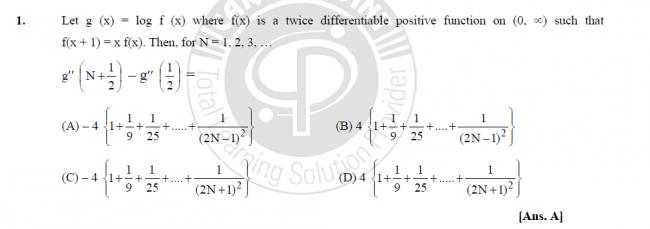Sir, NOT for this eg. I m toking of IN-GENWERAL ........ wats da shortest?? or is it Case To CAse BASIS only??
lyk wat shud u hunt 4 at first sight in this type........
PL NOTE : I KNOW how to solve the following Question ...............
My concern is the type :

IN such Questions wat is the instinctive Substituition one MAKES or waat are the primary OBSERVATIONS/DEDUCTIONS/SUBSTITUITIONs one shud at once think of after reading this type wer f(x) = f(x+n)*blah blah ....
PL. inform wat techniQ shall be the Quickest!!!
Sir, NOT for this eg. I m toking of IN-GENWERAL ........ wats da shortest?? or is it Case To CAse BASIS only??
lyk wat shud u hunt 4 at first sight in this type........
include it..
but what i meant by remove is that from the 2nd part...
r v suppose to remove the last case i.e.the terms where there is only 1 of them being used that is 3C1x 110 or include it???
oh ya quite definitely not.......
but lyk ne typical cases / eye-catcehrs that v must luk 4 wen v c dis ......
there is no 'one size fits all' answer for this.
You have to play around and be alert for the possibilities at every stage.
SIR, pl reply to this :
IN such Questions wat is the instinctive Substituition one MAKES or waat are the primary OBSERVATIONS/DEDUCTIONS/SUBSTITUITIONs one shud at once think of after reading this type wer f(x) = f(x+n)*blah blah ....
a dice is rolled 10 times.fined the no of ways in wich the outcome contain 1,2,3
ans: (310)-(3c2*210)+(3c1*110)
the expression above is a case of inclusion exclusion principle..
you first pick the numbers from 1,2,3 with any number of repetitions
that is 310
then we remove the terms where there are only 2 of them being used.. that is (3C2210)
Now we remove those with only 1 number that is 3C1x 110
a dice is rolled 10 times.fined the no of ways in wich the outcome contain 1,2,3
ans: (310)-(3c2*210)+(3c1*110)
g(x)=logf(x)
g(x+1)=logf(x+1)
g(x+1)-g(x)=log[f(x+1)/f(x)]=logx
g''(x+1)-g''(x)=-1/x2
The above is frm Manish bhaiyya's post #9
Now put N=1 & x=1/2
You get
g''(1/2 + 1) - g''(1/2) = - 4
Putting N=1 in the options , only A satisfies
This is short indeed. [1][1]
Sir, u shayad missd out on my FIRST line...........
This is wat i wanna know.....
IN such Questions wat is the instinctive Substituition one MAKES or waat are the primary OBSERVATIONS/DEDUCTIONS/SUBSTITUITIONs one shud at once think of after reading this type wer f(x) = f(x+n)*blah blah ....
PL. inform wat techniQ shall be the Quickest!!!
P.N. the eg. attested is jus an example of the type............ I managed to solv the eg.
I wanted sum tips 4 generalization on Such topics ,,,,,,,,,,,,,
g(x)=logf(x)
g(x+1)=logf(x+1)
g(x+1)-g(x)=log[f(x+1)/f(x)]=logx
g''(x+1)-g''(x)=-1/x2
putting x=1/2, 3/2 ...., (2N-1)/2
g''(3/2)-g''(1/2)=-1/(1/2)2
g''(5/2)-g''(3/2)=-1/(3/2)2
.....................
g''(N+1/2)-g''(N-1/2)=-1/((2N-1)/2)2
adding it you will get the result
I don't have any other method (shorter)
why not we use
f(x)=eg(x)
then differentiate
things become a hell lot of simpler !!!!!!!!!
[3] ok for abhi....
take f(x)=(x-1)f(x-1)
so, g(x)= ln(x-1) + ln(f(x-1))
now diff two times..
then try to find out the term for N=1 :P
then substitute Nin the ans and see which one satisfies :)